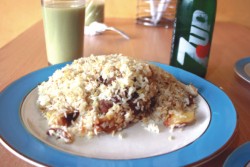|
Health
Do your Heart a Favour
cut down the Fat
 We live in a country where the majority of the population is below poverty level and on the brink of starvation. It is therefore ironic that a problem such as high cholesterol should be an issue. However, for the stark minority of the population that has access to three meals a day (if not more), high cholesterol is fast proving to be a huge concern. We live in a country where the majority of the population is below poverty level and on the brink of starvation. It is therefore ironic that a problem such as high cholesterol should be an issue. However, for the stark minority of the population that has access to three meals a day (if not more), high cholesterol is fast proving to be a huge concern.
Cholesterol is a substance found in your bloodstream and body cells. Some cholesterol is made by the body itself while others are transported to your body through certain foods. Your body needs cholesterol for a number of functions such as forming cell membranes, but an excess of cholesterol can lead to many complications such as coronary heart disease, stroke and peripheral vascular disease and may also be linked to other conditions such as high blood pressure and diabetes. Although your body needs cholesterol, it also makes up as much as you need, making the presence of additional cholesterol in your body possibly life-threatening.
Since fatty substances such as cholesterol cannot dissolve in the blood, they are carried between cells by lipoproteins. Although there are many different types of lipoproteins, there are two that are particularly important: low density lipoproteins (LDL) and high density lipoproteins (HDL). The problem is that if there is too much LDL in the body it clogs up the heart and brain and causes plaque within the arteries, causing a condition called atherosclerosis where a clot basically blocks the blood flow to the heart and other vital organs. LDL is known as 'bad cholesterol' and so the lower your LDL is the less at risk you are of having a heart attack. The presence of HDL, however, tends to cause cholesterol away from the arteries and towards the liver which in turn passes it out from the body. It is also believed that HDL removes cholesterol from plaque and therefore, HDL is known as 'good cholesterol.'
Most cholesterol-rich foods are from animals -- milk, beef, poultry, egg yolks and dairy products, whereas most foods that come from plants are cholesterol-free, such as fruits, vegetables, seeds and nuts. Being a nation that does not necessarily pride itself on healthy eating, it is easy to see where we go wrong. Our diets consist of an alarmingly high consummation of meat and poultry, not to mention the amount of ghee, oil and other fatty substances into such food as biryani and tehari. Now, realistically people do not eat biriyani or tehari but for once every few months, but it is still necessary to understand just how dangerous it can be. There are a few simple ways of rectifying this slight glitch. Have lots and lots of fruits and nuts for snacks, rather than the fatty and oily foods that we are used to having. Instead of using butter or even margarine (which, until recently, was said to be the healthier version of butter) use olive oil. Eat lots of vegetables -- there are many tasty and non-ghee and butter ways to eat vegetables if you just take the time to find them out. Have oatmeal for breakfast, it is said to be a cholesterol-lowering food, and a good substitute for eggs. Choose food that is rich in fibre, such as whole grains. Choose fish instead of meat -- this should not be too hard for us Bangalis especially considering how much healthier it is.
It is not necessary to change your entire lifestyle and stop enjoying life completely by giving up all your favourite foods. However, it is important to remember that everything should be done in moderation and that living a nice clean healthy lifestyle means changing your eating habits so that you do not suffer for it later on.
TheStar magazine Desk
Copyright
(R) thedailystar.net 2007
|
